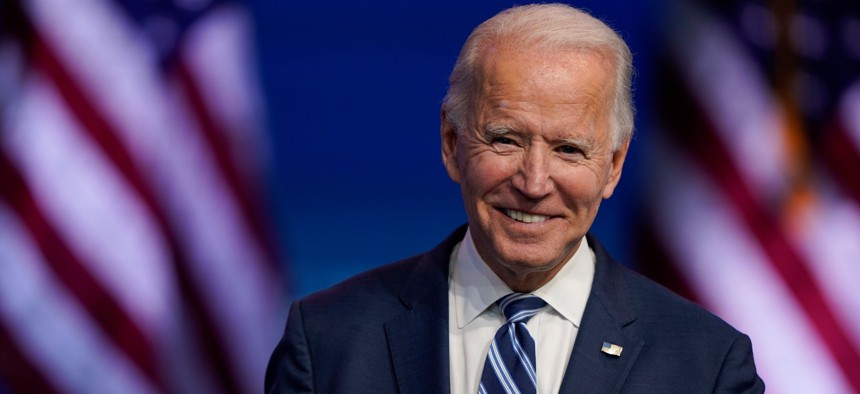Major Changes to Internet Regulation Unlikely Under Biden Administration

Carolyn Kaster/AP
A split Congress makes major internet policy changes even more unlikely.
The internet as we know it probably won’t change much under President-elect Joe Biden and Vice President-elect Kamala Harris, according to an internet policy election analysis released Friday by Bloomberg Intelligence.
The analysis calls out Senate control as “the most important factor” that will shape the potential for a new federal law that impacts internet companies. Currently, Republicans hold 50 seats, with two seats up for grabs in a Georgia runoff election slated for January. If Democrats win both seats, Harris could serve as the tie-breaking vote in Senate matters.
Even under this scenario, however, the analysis suggests the razor-thin margins in both chambers will force compromise between the parties on data privacy that could lessen the blow of any major legislation on industry.
“With either party at most holding only a narrow edge, data-privacy legislation will need bipartisan support,” the analysis states. “That has stymied legislation during the current Congress, as Republicans favor more industry friendly approaches and often focus on different internet-related concerns than Democrats. Still, we think lawmakers can reach compromises to enact a federal law that shapes the regulatory landscape for years.”
Matt Schettenhelm, senior analyst for Bloomberg Intelligence and one of the authors of the analysis, said any new internet law under a Biden administration is likely to include tenants of transparency and accountability for companies rather than structural changes to how companies do business. A true “blue wave” election might have prompted a stronger hand from Democrats, allowing them to enact policies that “deal with the actual business of collecting and using data.” Instead, forcing internet companies to be more transparent about the date they do ingest, he said, is a likely compromise.
The narrow margins in Congress also make it unlikely Democrats can make do on the creation of a new federal agency to police the internet—an idea flouted by Senate democrats in legislation last year. More likely, Schettenhelm said, is legislation that strengthens the Federal Trade Commission. Ultimately, this poses less risk to internet companies, especially large tech firms.
“A new federal law will likely couple new transparency requirements with more clout for the Federal Trade Commission to monitor and penalize for ‘unfair’ or ‘deceptive’ practices. In our view, this would increase business costs yet would have only a modest impact on Facebook, Google and Twitter,” the analysis said.
The analysis also makes clear that significant changes are unlikely to section 230 of the Communications Decency Act, which shields internet companies from lawsuits related to content posted by users on their platforms. While President Trump and President-elect Biden have expressed the desire to repeal Section 230, Schettenhelm said he is “deeply skeptical that lawmakers will land there.” The more likely option, he said, is “some tinkering around the edges and maybe some carve-outs.” He called a full repeal “almost impossible to see.”
In addition, Schettenhelm said he expects legislation to open doors for new companies to come into the tech market, with lawmakers careful not to impede competition. Tech regulatory legislation will probably only apply to large existing companies and tech platforms, he added.



